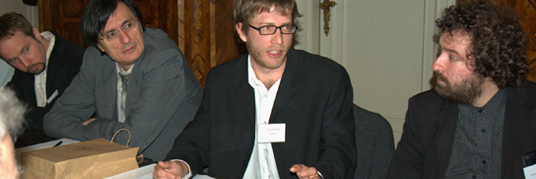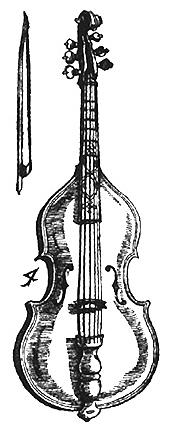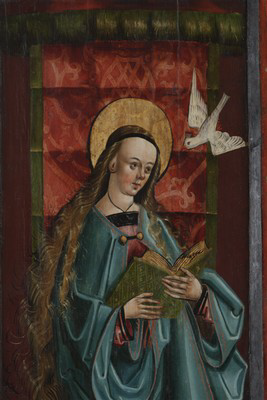* You are viewing Posts Tagged ‘Jan Amos Comenius’
Applications are invited for an international PhD programme The Traditions of the Mediterranean Humanism and Challenges of our Times: The Frontiers of Humanity. Co-funded by the European Union, the programme is organised by the Institute for Interdisciplinary Studies ‘Artes Liberales’ at the University of Warsaw, and offers forty-eight months of paid fellowships across over a dozen thematic strands, including 12-18 months in Austria, the Czech Republic, France, Great Britain, Greece, Hungary, Macedonia, Russia, Spain, or the USA (at a stipend of about 770 euros per month, increased to 1,150 euros when abroad). Applicants to the strand Universal Reformation: Intellectual Networks in Early Modern Central Europe will explore major intellectual movements in early modern central Europe in the post-Reformation period, including correspondence networks and the transfer of knowledge due to the displacement of scholars and shifting local intellectual and religious traditions. As well as stays at the Centre for Early Modern Studies at the University of Aberdeen and the Institute of Philosophy at the Czech Academy of Sciences, this will comprise a six-month stay at the University of Oxford, where, via the Modern European History Research Centre, candidates will benefit from synergies with Cultures of Knowledge and be co-supervised by Project Director Professor Howard Hotson. The deadline for applications is 17 July 2010. For full details, please see the programme website.

Workshop participants in discussion. © SOM
The third and final workshop in our extremely successful east-central European series took place last month in Budapest on the theme of ‘Encyclopaedism, Pansophia, and Universal Communication, 1560-1670′. The workshop was generously hosted and co-sponsored by Central European University and the Semmelweis Museum, Library, and Archives of the History of Medicine (with additional financial support from the Institute of Literary Scholarship of the Hungarian Academy of Sciences and the Institute for Literary Studies and Lingusitics of the University of Miskolc), and was organised by Márton Szentpéteri, Gábor Kecskeméti, Benedek Varga, and Márton Zászkaliczky. It allowed eighteen emerging and established scholars to converge on the related seventeenth-century ideas of collecting all knowledge into a single coherent system and of teaching all things to all men, as well as the networks and communicative strategies by which these universalist philosophies were disseminated across the fragmented geographical and political canvas of east-central Europe. For full details of the workshop, including abstracts and photographs, please see the workshop webpage. Themes addressed in the course of the workshop series will be drawn together in the international conference Universal Reformation: Intellectual Networks in Central and Western Europe, 1560-1670 (St Anne’s College, University of Oxford, 21-23 September).
 Last Saturday’s edition of The Early Music Show on BBC Radio 3 showcased on a fascinating collection of instrumental music from seventeenth-century Germany (land of Comenius, and a comparative focus our 2011 conference), known as Das Partiturbuch Ludwig. The manuscript was put together by musician Jacob Ludwig as a birthday present in 1662 for his former employer in Wolfenbüttel, Duke August of Gotha. Now in the care of the Herzog August Bibliothek, it provides a rare insight into the musical cultures of the Holy Roman Empire in the middle decades of the seventeenth century. The programme is available for the next few days on the iPlayer.
Last Saturday’s edition of The Early Music Show on BBC Radio 3 showcased on a fascinating collection of instrumental music from seventeenth-century Germany (land of Comenius, and a comparative focus our 2011 conference), known as Das Partiturbuch Ludwig. The manuscript was put together by musician Jacob Ludwig as a birthday present in 1662 for his former employer in Wolfenbüttel, Duke August of Gotha. Now in the care of the Herzog August Bibliothek, it provides a rare insight into the musical cultures of the Holy Roman Empire in the middle decades of the seventeenth century. The programme is available for the next few days on the iPlayer.
James Brown
December 15, 2009
Exhibitions
Tags: Jan Amos Comenius
 A new exhibition on ‘Art of the Bohemian Reformation, 1380-1620′, curated by our Comenius Postdoctoral Fellow Dr Kateřina Horníčková, will open tomorrow (16 December 2009) at the Imperial Stable of Prague Castle. During the Reformation each of the Christian denominations in the Czech lands used art for representational purposes but, although many of these works survive, those created for non-Catholics have remained little known. The only Protestant church to enjoy legal recognition was the Utraquist; the Unity of Brethren (whose last bishop was Jan Amos Comenius), Lutherans, and Calvinists, did not gain full legal status until 1609. The exhibition, which showcases over 120 works, marks the 400th anniversary of this occasion. It encompasses late-fourteenth-century Hussitism and criticism of the use of images in religious practice, through a blossoming of art under Utraquism and Lutheranism, to the 1619 iconoclasm in St Vitus’s Cathedral, and the final years of the Refomation, which ended with the defeat of Protestant forces at the Battle of White Moutain. Klaudián’s map of Bohemia, the Codex of Jena, the Litoměřice Gradual with its depictions of Jan Hus, a carved altar by the Master IP from the church of the Our Lady upon Tyne, treasures from Kutná Hora, and works by the Rudolphinian artist Bartolomeus Spranger are among the sculptures, altar-pieces, ecclesiastical ornaments, and illuminated manuscripts through which it is possible to trace the radical shift from religious icon as object of veneration to that of image used for didactic, decorative, memorial, and representational purposes. The exhibition runs until 4 April 2010; for full details, see the website.
A new exhibition on ‘Art of the Bohemian Reformation, 1380-1620′, curated by our Comenius Postdoctoral Fellow Dr Kateřina Horníčková, will open tomorrow (16 December 2009) at the Imperial Stable of Prague Castle. During the Reformation each of the Christian denominations in the Czech lands used art for representational purposes but, although many of these works survive, those created for non-Catholics have remained little known. The only Protestant church to enjoy legal recognition was the Utraquist; the Unity of Brethren (whose last bishop was Jan Amos Comenius), Lutherans, and Calvinists, did not gain full legal status until 1609. The exhibition, which showcases over 120 works, marks the 400th anniversary of this occasion. It encompasses late-fourteenth-century Hussitism and criticism of the use of images in religious practice, through a blossoming of art under Utraquism and Lutheranism, to the 1619 iconoclasm in St Vitus’s Cathedral, and the final years of the Refomation, which ended with the defeat of Protestant forces at the Battle of White Moutain. Klaudián’s map of Bohemia, the Codex of Jena, the Litoměřice Gradual with its depictions of Jan Hus, a carved altar by the Master IP from the church of the Our Lady upon Tyne, treasures from Kutná Hora, and works by the Rudolphinian artist Bartolomeus Spranger are among the sculptures, altar-pieces, ecclesiastical ornaments, and illuminated manuscripts through which it is possible to trace the radical shift from religious icon as object of veneration to that of image used for didactic, decorative, memorial, and representational purposes. The exhibition runs until 4 April 2010; for full details, see the website.


 Last Saturday’s edition of
Last Saturday’s edition of  A new exhibition on ‘Art of the Bohemian Reformation, 1380-1620′, curated by our
A new exhibition on ‘Art of the Bohemian Reformation, 1380-1620′, curated by our 
 Join
Join 